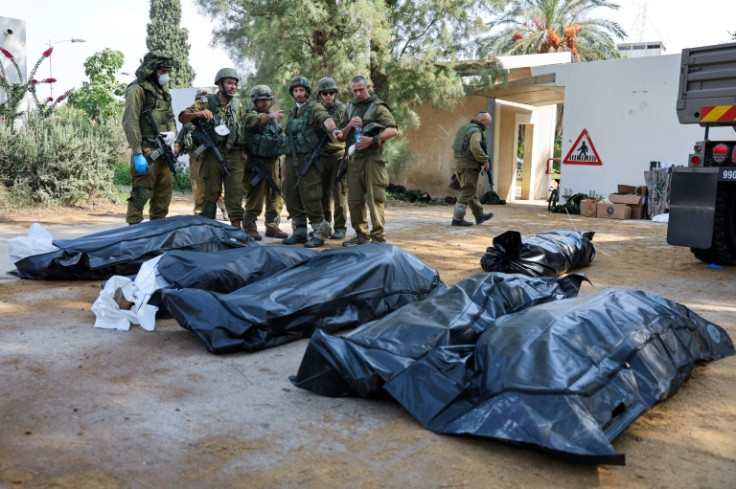Hamas Kill Record Number Of IDF Soldiers On Israel's Deadliest Day Yet
A Hamas attack kills more than 20 Israeli militants in 24 hours as Netanyahu continues to reject the eventual Palestinian state.

Yesterday, more than 23 Israeli Defence Forces (IDF) soldiers were killed by Hamas, marking the deadliest day of conflict for Israel.
The proscribed terrorist group launched an attack on the IDF while they were setting up explosives in a complex of buildings along the Gaza-Israel border.
According to the initial IDF account of events, Israel's army was installing the explosives in two damaged homes until a Hamas militant fired a rocket-propelled grenade at a tank that was situated near the complex.
The grenade set off a series of explosions that led to the buildings collapsing.
Rear Admiral Daniel Hagari explained: "The first rocket hit one of the buildings in which explosives had been laid out. The hit apparently led to the explosion that caused the collapse of the building and the building next to it."
On the same day, Tuesday 23 January, three IDF soldiers were killed in a separate attack.
In an IDF briefing, Hagari said that the small group of reservists were killed during an operation that would see civilians in the south of Israel return home for the first time since Hamas' on-the-ground massacre of Israelis.
The three soldiers were killed in central Gaza, in a region close to the kibbutz of Kissufim that was evacuated shortly after the October 7 assault.
Since 7 October, as Israel continues its ground offensive and bombardment of the Gaza Strip, more than 220 Israeli soldiers have been killed in the besieged enclave.
"We share in the sorrow of their families for the heavy loss and know that the pain is unbearable," Lieutenant General Herzi Halevi, the Chief of Staff for the IDF, said.
As the death toll in the Palestinian territory mounts above a tragic 25,000, the Hamas-run Health Ministry in Gaza said that 195 Palestinians were also killed yesterday.
Despite the catastrophic number of deaths, right-wing Prime Minister Benjamin Netanyahu said that his militants would continue to "eliminate" terror targets in Gaza.
The IDF is set to push on with its ground offensive until Israel has reached an "absolute victory", according to Netanyahu.
In a statement published yesterday, the Israeli Prime Minister urged: "We must learn the necessary lessons and do everything to preserve the lives of our warriors."
Netanyahu went on to recognise the number of fatalities amongst IDF militants, saying: "In the name of our heroes, and for our own lives, we will not stop the fight until reaching absolute victory."
As part of Israel's "absolute victory", the IDF agreed that its operations would not halt in Gaza until Hamas released all hostages from captivity – currently measuring more than 130 persons.
Prior to the Israel-Hamas conflict escalation, the controversial leader was already facing political criticisms and public campaigns that called for his sacking.
After publicly rejecting the US' call for a two-state solution and refusing to recognise an eventual Palestinian state, Netanyahu sparked an international outrage amongst the public and world leaders.
Israel "must have security control over the entire territory west of the Jordan River", the Israeli Prime Minister continued.
While discussing Israel's "right to defend itself", Labour Leader Keir Starmer disagreed with Netanyahu and reiterated the importance of a two-state solution.
"The comments [made by] Prime Minister Netanyahu are unacceptable and they are wrong," Starmer told reporters.
The left-wing Party Leader went on to explain: "Palestinian statehood is not in the gift of a neighbour. It is the inalienable right of the Palestinian people. It's also the only way to a secure settlement and a secure future."
While appearing at the World Economic Forum in Switzerland, US Secretary of State Antony Blinken also disagreed with Netanyahu, noting that the pathway to a Palestinian state ensures that Israel will receive "genuine security" when the conflict finally halts.
© Copyright IBTimes 2025. All rights reserved.





















